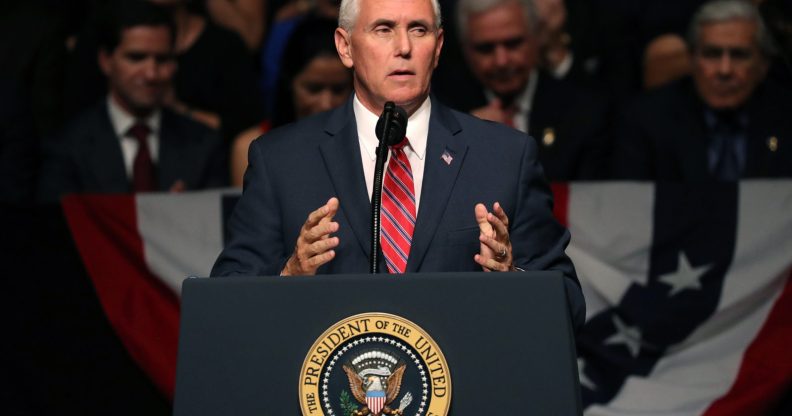Most Christians don’t support laws to permit religious anti-LGBT discrimination

(Joe Raedle/Getty Images)
(Joe Raedle/Getty Images)
The majority of Christians in the United States do not support laws to permit discrimination against LGBT people.
Donald Trump and Mike Pence have pledged their support for the First Amendment Defense Act, which would protect religious people who discriminate against people who are LGBT.
Hardline Republicans claim that the law is an important safeguard for religious freedom, but it turns out that most religious people don’t actually support it.
The news comes from research from the Public Religion Research Institute, which polled 40,000 people across America on proposed ‘religious freedom’ laws.

The polling reveals that more than six in ten (61%) Americans oppose allowing small business owners to refuse to provide products or services to gay or lesbian people. Three in ten (30%) Americans support their right to to do so.
In a surprise turn of events, there is not a single religious group in which a majority supports allowing small business owners to refuse services to gay and lesbian people.
62% of white mainline protestants now oppose the laws, alongside 66% of black protestants, 52% of hispanic protestants, and 62% of Catholics.
The law garnered more support among fringe religions, but even then only half (50%) of white evangelicals and and fewer than half of Mormons (42%) believed in the right to discriminate.
Ethnic minority groups were more likely to oppose anti-LGBT discrimination than white people, according to the research.
Meanwhile, six in ten white (60%), Hispanic (62%), API (65%), and black Americans (68%) oppose a policy that would allow small businesses to refuse services to gay and lesbian people.
58% of Americans believe gay and lesbian people face a lot of discrimination in the country today.
PRRI research director Dan Cox said: “At a time when Americans appear more divided than ever by partisanship and religion, there is increasing evidence that debates over gay rights have a short shelf life.”
Donald Trump has previously signed a pledge supporting the so-called First Amendment Defence Act, which bans the government from taking any “action against a person, wholly or partially on the basis that such person believes or acts in accordance with a religious belief or moral conviction that marriage is or should be recognised as the union of one man and one woman, or that sexual relations are properly reserved to such a marriage.”
He claimed last year: “Religious liberty is enshrined in the First Amendment to the Constitution.
“It is our first liberty and provides the most important protection in that it protects our right of conscience. Activist judges and executive orders issued by Presidents who have no regard for the Constitution have put these protections in jeopardy.
“If I am elected president and Congress passes the First Amendment Defense Act, I will sign it to protect the deeply held religious beliefs of Catholics and the beliefs of Americans of all faiths.”

